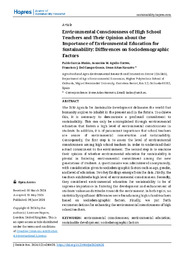Por favor, use este identificador para citar o enlazar este ítem:
https://hdl.handle.net/11000/37846Registro completo de metadatos
| Campo DC | Valor | Lengua/Idioma |
|---|---|---|
| dc.contributor.author | García Muñio, Pablo | - |
| dc.contributor.author | Agulló Torres, Asunción M. | - |
| dc.contributor.author | del Campo Gomis, Francisco J. | - |
| dc.contributor.author | Arias Navarro, Irene | - |
| dc.contributor.other | Departamentos de la UMH::Economía Agroambiental,Ing. Cartográfica y Expresión Gráfica en la Ingeniería | es_ES |
| dc.date.accessioned | 2025-11-04T11:23:12Z | - |
| dc.date.available | 2025-11-04T11:23:12Z | - |
| dc.date.created | 2024-06 | - |
| dc.identifier.citation | J Sustain Res. 2024;6(2):e240026 | es_ES |
| dc.identifier.issn | 2632-6582 | - |
| dc.identifier.uri | https://hdl.handle.net/11000/37846 | - |
| dc.description.abstract | The 2030 Agenda for Sustainable Development delineates the world that humanity aspires to inhabit in the present and in the future. To achieve this, it is necessary to demonstrate a profound commitment to sustainability. This can only be accomplished through environmental education that fosters a high level of environmental consciousness in students. In addition, it is of paramount importance that school teachers are aware of environmental conservation and sustainability. Consequently, the first step is to assess the level of environmental consciousness among high school teachers in order to understand their actual commitment to the environment. The second step is to examine their opinion of whether environmental education for sustainability is pivotal in fostering environmental commitment among the new generations of students. A questionnaire was administered anonymously, with consideration given to sociodemographic factors such as age, gender, and level of education. Two key findings emerge from the data. Firstly, the teachers exhibited a high level of environmental consciousness. Secondly, they considered environmental education for sustainability to be of supreme importance in fostering the development and enhancement of students' values and attitudes towards the environment. In both topics, no statistically significant differences were found among high school teachers based on sociodemographic factors. Finally, we put forth recommendations for enhancing the environmental consciousness of high school teachers. | es_ES |
| dc.format | application/pdf | es_ES |
| dc.format.extent | 19 | es_ES |
| dc.language.iso | eng | es_ES |
| dc.publisher | Hapres | es_ES |
| dc.rights | info:eu-repo/semantics/openAccess | es_ES |
| dc.rights | Attribution-NonCommercial-NoDerivatives 4.0 Internacional | * |
| dc.rights.uri | http://creativecommons.org/licenses/by-nc-nd/4.0/ | * |
| dc.subject | environmental consciousness | es_ES |
| dc.subject | environmental education | es_ES |
| dc.subject | environmental education | es_ES |
| dc.subject | sociodemographic factors | es_ES |
| dc.title | Environmental consciousness of high Sdchool teachers and their opinion about the importance of environmental education for sustainability: differences on sociodemographic factors | es_ES |
| dc.type | info:eu-repo/semantics/article | es_ES |
| dc.relation.publisherversion | https://doi.org/10.20900/jsr20240026 | es_ES |

Ver/Abrir:
2024-JSR_1599.pdf
380,74 kB
Adobe PDF
Compartir:
 La licencia se describe como: Atribución-NonComercial-NoDerivada 4.0 Internacional.
La licencia se describe como: Atribución-NonComercial-NoDerivada 4.0 Internacional.
.png)